Vintage Treasures: Combat SF edited by Gordon R. Dickson
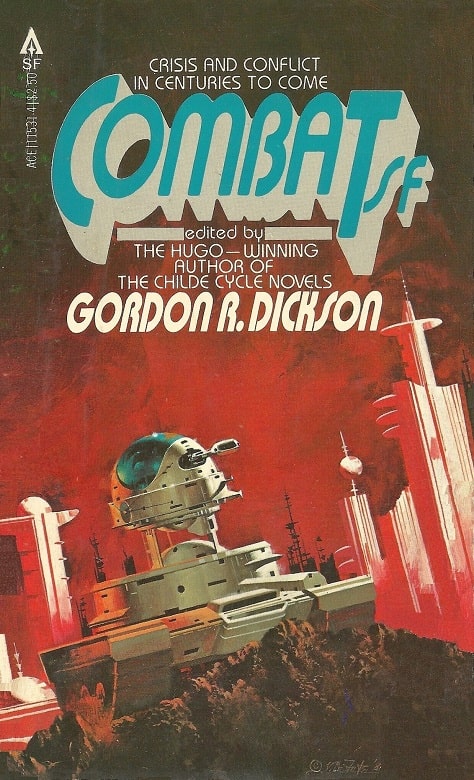 |
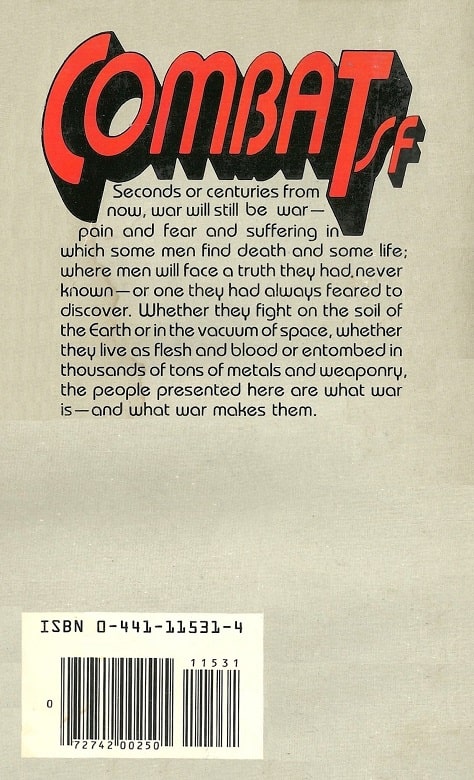 |
Combat SF (Ace Books, June 1981). Cover by Vincent Di Fate
Military science fiction has a long and honorable history, from Heinlein’s Starship Troopers to Joe Haldeman’s The Forever War and John Scalzi’s Old Man’s War. It’s not nearly as prevalent on bookstore shelves as it used to be. Some people say that’s because science fiction is no longer a male-dominated genre that panders to young male power fantasies. And those people are mostly right.
But there’s still plenty of military science fiction that I remember fondly — especially the anthologies. The 70s and 80s was a golden age of mass market SF anthologies, and plenty of the better ones had military themes, like Joe Haldeman’s Tomorrow’s Warfare series (Body Armor: 2000, Supertanks, Space-Fighters), David Drake’s Space trilogy (Space Gladiators, Space Infantry, Space Dreadnoughts), and Jerry Pournelle’s There Will Be War.
But my favorite military SF from the era were the standalone anthologies. Including Combat SF, edited by Gordon R. Dickson, a terrific volume which includes stories by Arthur C. Clarke, Keith Laumer, Frank M. Robinson, David Drake, Joseph Green, Poul Anderson, Fred Saberhagen, Joe Haldeman, James White, Harry Harrison, Gene Wolfe, Hal Clement, and others.
[Click the images to engage with larger versions.]
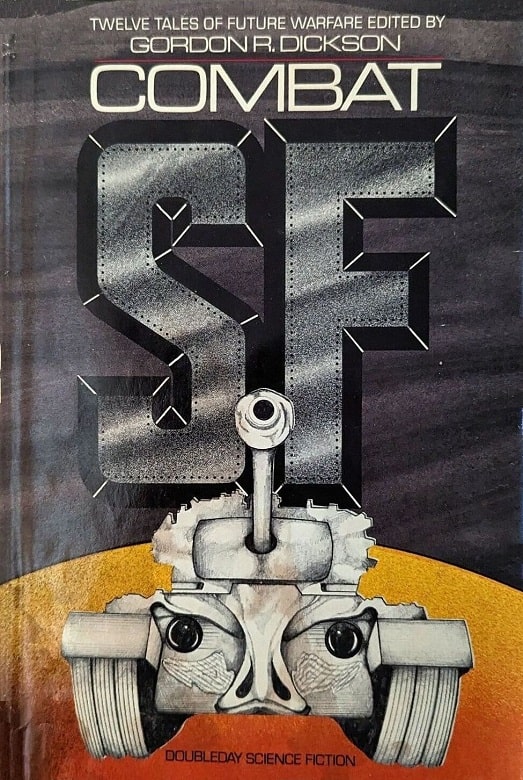 |
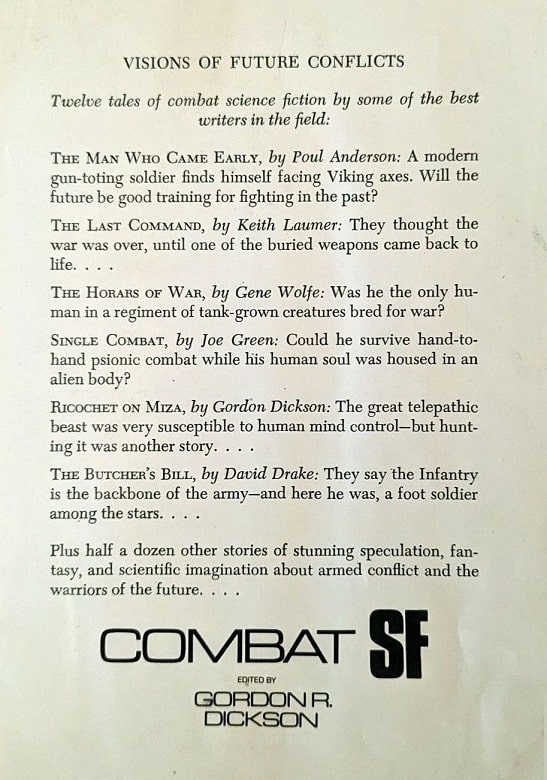 |
Combat SF (Doubleday, June 1975). Cover by Robert Aulicino
Combat SF was originally published in hardcover by Doubleday in June 1975, with half a dozen intriguing story teasers on the back cover (see above).
It took six years to finally show up in paperback from Ace Books, but the stellar Vincent Di Fate cover made it worth the wait (see the Ace paperback at top).
Combat SF hasn’t been reprinted since, but it still gets some attention from those worthy souls who read old paperbacks. Here’s my favorite Goodreads review, from Charles (written 2009).
Probably my favorite of the Future war type anthologies. This one came out even before the Future at War series and probably influenced that, and the later There Will Be War. Excellent stories, including the usual suspects, Drake, Anderson, Clarke, and a wonderful little story by Dickson called “Richochet on Miza.”
Here’s the cover flaps for the hardcover edition.
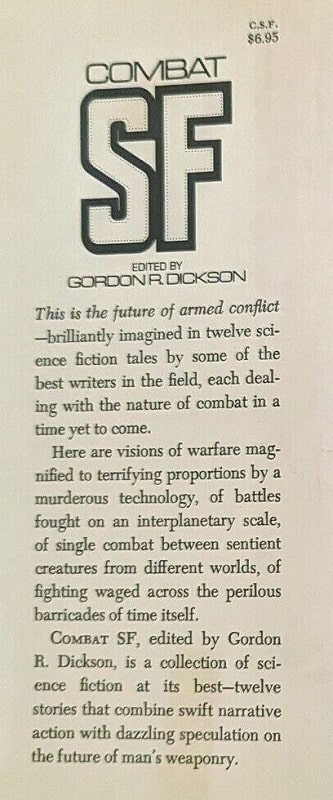 |
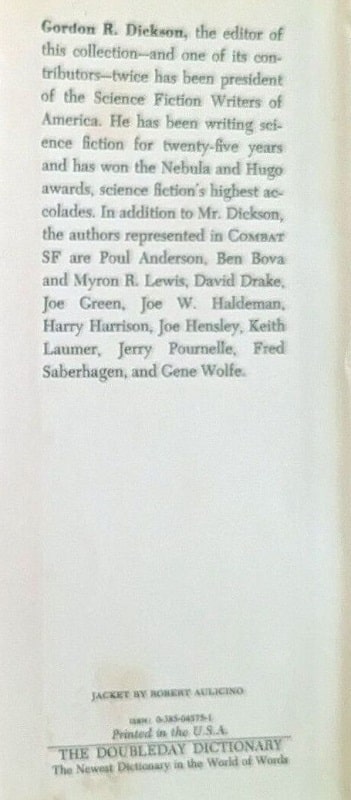 |
Cover flaps for Doubleday edition
Combat SF makes a fine introduction to some of the most popular military SF series of the last century, including Keith Laumer’s Bolo (via “The Last Command), David Drake’s Hammer’s Slammers (the novelette “The Butcher’s Bill”), and Fred Saberhagen’s classic Berserker tales (“Patron of the Arts”).
Here’s the complete Table of Contents.
Introduction by Gordon R. Dickson
“Hide and Seek” by Arthur C. Clarke (Astounding Science Fiction, September 1949)
“The Last Command” by Keith Laumer (Analog, January 1967)
“Men of Good Will” by Ben Bova and Myron R. Lewis (Galaxy Magazine, June 1964)
“The Pair” by Joe L. Hensley (Fantastic Universe, July 1958)
“Situation Thirty” by Frank M. Robinson (Astounding Science Fiction, January 1951)
“The Butcher’s Bill” by David Drake (Galaxy, November 1974)
“Single Combat” by Joseph Green (New Worlds SF, July-August 1964)
“The Man Who Came Early” by Poul Anderson (The Magazine of Fantasy and Science Fiction, June 1956)
“Patron of the Arts” by Fred Saberhagen (If, August 1965)
“Time Piece” by Joe Haldeman (If, July-August 1970)
“Ricochet on Miza” by Gordon R. Dickson (Planet Stories, March 1952)
“The Scavengers” by James White (Astounding Science Fiction, October 1953)
“No War, or Battle’s Sound” by Harry Harrison (If, October 1968)
“The Horars of War” by Gene Wolfe (Nova 1, 1970)
“Fireproof” by Hal Clement (Astounding Science Fiction, March 1949)
Gordon R. Dickson didn’t edit a lot of other anthologies. One Nebula volume (Nebula Winners Twelve, 1978) and two horror anthologies edited for Rod Serling and Bantam Books: Rod Serling’s Triple W: Witches, Warlocks and Werewolves (1963) and Rod Serling’s Devils and Demons (1967).
The Serling volumes are worth tracking down, with stories by Jack Sharkey, Malcolm Jameson, Nathaniel Hawthorne, Fritz Leiber, Rudyard Kipling, Charles G. Finney, Charles Mackay, Avram Davidson, Carol Emshwiller, Judith Merril, H. G. Wells, Ben Bova, Robert Louis Stevenson, Kate Wilhelm — and, yes, Gordon R. Dickson.
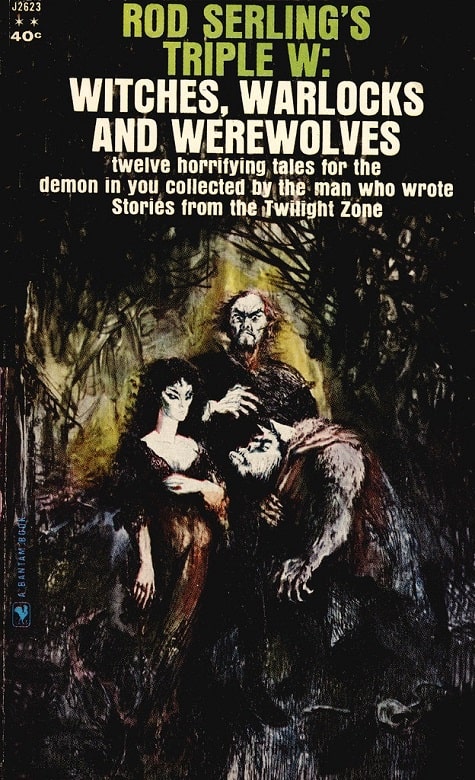 |
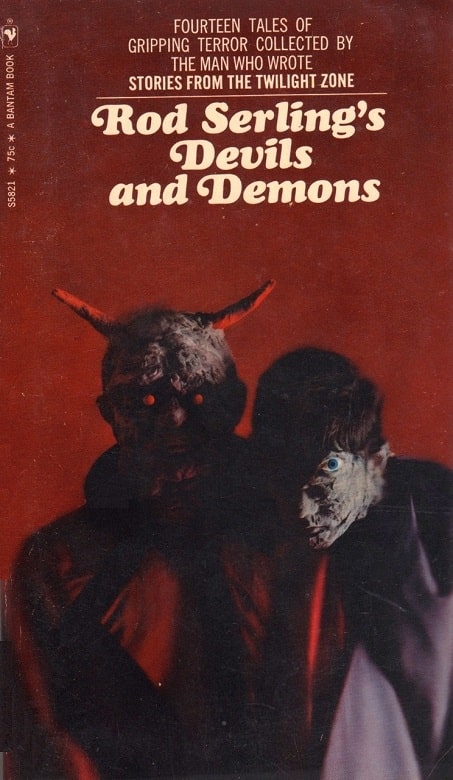 |
Rod Serling’s Triple W: Witches, Warlocks and Werewolves and
Rod Serling’s Devils and Demons, both edited by Gordon R. Dickson
(Bantam Books, March 1963 and February 1967). Covers by Louis S. Glanzman, unknown
In 1991, near the height of the shared-world craze, Dickson also tried his hand at editing a shared world series with a military SF bent, The Harriers. Only two volumes were ever produced, both from Baen: Of War and Honor (1991) and Blood and War (1993).
Our previous coverage of Gordon R. Dickson includes:
Spacial Delivery by Fletcher Vredenburgh (2017)
New Treasures: The Best Of Gordon R. Dickson, Volume 1 edited by Hank Davis (2017)
Dorsai And Secret Psi Powers: Rich Horton on The Genetic General/Time to Teleport (2016)
Vintage Treasures: None But Man (2015)
Vintage Treasures: Jamie the Red by Gordon R. Dickson with Roland Green (2015)
Dickson’s Dorsai! to hit Small Screen by Bill Ward (2010)
Combat SF was published in hardcover by Doubleday in June 1975, and reprinted in paperback by Ace Books in June 1981. The paperback edition is 276 pages, priced at $2.50. The excellent cover is by Vincent Di Fate. It has been out of print since 1984, and there is no digital edition.
See all our recent Vintage Treasures here.
I like Di Fate’s cover art for the paperback; it’s a variation of a piece he did for the March 1976 issue of Analog where he showed one of Keith Laumer’s Bolos in action (story was “Field Test”). I looked up an old review Spider Robinson (no relation) did for the book for Galaxy, where he said, in part, “Recommended without reservation — there’s none of that love and sex crap in it anywhere.” I found a copy on eBay which is now ordered and should shortly be on its way to me, along with a couple other books you mentioned. It’s sad that books like these are getting more and more scarce and not being reprinted. It makes me wonder if anyone will remember them in another generation or two. Well, in the meantime, thanks go to you John for keeping the alive and in front of readers like myself and others. It’s much appreciated.
Mark,
I know just the issue! One of the best Analog covers of the 70s, and no mistake. Right in the middle of their serialization of Frank Herbert’s Children of Dune, if I remember correctly. It was a good time to be reading Analog!